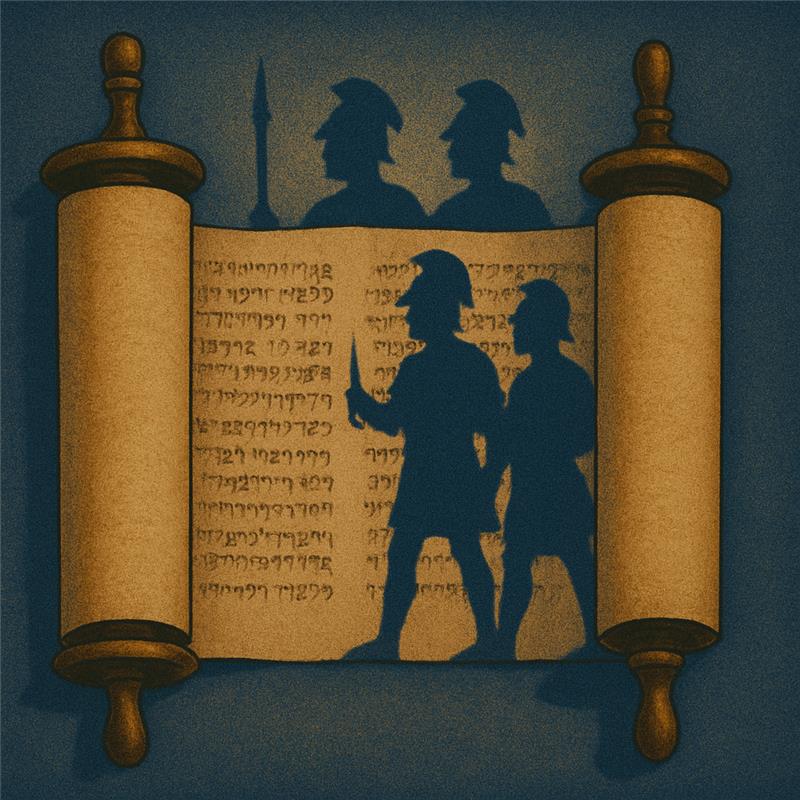Home » About Rabbi Meir » Torah Teachings & Wisdom » Decoding ‘Others Say’ – Final Complete Article
What Does 'Acherim Omrim' Mean?
Understanding This Mysterious Talmudic Phrase
Discover how the phrase ‘Others Say’ conceals one of the Talmud’s greatest teachers and reveals lessons about humility and anonymous giving.
The phrase ‘acherim omrim’ holds one of the Talmud’s most interesting mysteries. These Hebrew words mean ‘others say’ and appear throughout Jewish texts. Yet most people do not know that acherim omrim and Rabbi Meir connections run deep – this phrase often represents Rabbi Meir Baal Haness himself. The Horayot 13b story behind this anonymous attribution teaches us about humility in Judaism and anonymous giving.
For over two centuries, Rabbi Meir Baal Haness Charities has helped donors follow Rabbi Meir’s example through anonymous support for needy families in Eretz Yisroel.
What Does 'Acherim Omrim' Mean?
The acherim omrim meaning goes beyond its simple translation of ‘others say’ in English. Understanding the others say Talmud references requires knowing their historical context. The phrase introduces teachings of others without naming who said them. The Gemara reveals something surprising: when we see ‘acherim omrim’, we are often reading Rabbi Meir’s own words.
Years later, Rabbi Yehuda haNasi, called Rebbi, compiled the Mishnah around 200 CE. He chose to record many of Rabbi Meir’s teachings without his name. The Talmud in Sanhedrin 86a teaches us the principle of stam Mishnah – that stam Mishnah Rabbi Meir means anonymous passages follow his opinion. This means anonymous laws in the Mishnah likely come from Rabbi Meir himself.
Did You Know?
Why Rabbi Meir's Name Was Removed from His Teachings
The famous Horayot 13b story explains the complete acherim omrim explanation. It unfolds in the Talmud Bavli (Babylonian Talmud). At that time, the Sanhedrin had three main leaders. Rabban Shimon ben Gamliel served as Nasi (president). Rabbi Meir was the Chacham (chief scholar). Rabbi Nasan held the position of Av Beis Din (deputy leader).
Rabbi Meir and Rabbi Nasan held a sincere belief that Torah leadership required complete scholarly mastery. According to their understanding, the Nasi should possess expertise in every area of Jewish law, including the most complex sections. They chose to test Rabban Shimon ben Gamliel on Tractate Okatzim – the challenging laws of ritual purity regarding produce – believing this was a matter of maintaining proper Torah standards. Their actions, though ultimately deemed inappropriate by the Sanhedrin, came from a place of wanting to ensure the highest level of Torah scholarship in leadership positions.
But their plan failed. Rabban Shimon ben Gamliel learned about their intentions ahead of time. He studied the tractate intensively and mastered it completely. When they tested him, he answered all their questions correctly. The attempted coup backfired. As punishment, both Rabbi Meir and Rabbi Nasan were expelled from the study hall.
How Punishment Became a Blessing
As the Horayot 13b story reveals, the Sanhedrin soon realized they needed these two great sages. The study hall could not function without their wisdom. So they reached a compromise. Rabbi Meir and Rabbi Nasan could return, but with one condition. Their teachings would no longer carry their names.
From then on, Rabbi Meir’s opinions would be introduced as “acherim omrim” – others say. Rabbi Nasan’s would appear as yesh omrim’ – some say. This was meant as punishment to reduce their honor. But something unexpected happened. The punishment actually elevated Rabbi Meir’s teachings.
Support Anonymous Giving Today
Without his name attached, Rabbi Meir’s teachings became part of the anonymous foundation of Jewish law. The others say Mishnah passages preserve his wisdom for eternity. His ideas were no longer tied to one person. They became universal principles that guide us today. The ‘acherim omrim’ explanation shows how losing personal recognition can lead to greater influence.
This story exemplifies humility in Judaism – the recognition that Torah wisdom belongs to all Israel, not individuals. The concept of humility in Judaism teaches that the greatest scholars often have the least attachment to personal recognition.
Rabbi Meir's Anonymous Legacy in the Mishnah
Despite having his name removed, Rabbi Meir’s influence fills the entire Talmud. The principle of “stam Mishnah Rabbi Meir” means anonymous Mishnah passages generally represent his views. His teachings form the backbone of Jewish law, even without credit.
Rebbi, who compiled the Mishnah, was actually the son of Rabban Shimon ben Gamliel. He upheld the practice of keeping Rabbi Meir anonymous to honor his father. Yet Rebbi deeply respected Rabbi Meir. The Talmud Bavli in Eruvin 13b says Rebbi credited his sharp mind to having seen Rabbi Meir “from behind” – meaning even a glimpse of this great sage had profound impact.
But who are acherim really? They are the unnamed voices that shape our tradition.Rabbi Meir accepted his anonymity with grace. He understood that Torah wisdom belongs to all Israel, not to any individual. His teachings achieved a form of immortality that named attribution could never provide.
The Connection to Anonymous Tzedakah
The story of ‘acherim omrim’ teaches us about anonymous charity. Just as Rabbi Meir’s teachings gained eternal influence without his name, giving without recognition represents the highest form of tzedakah. The Rambam (Maimonides) lists Eight Levels of Charity in his Mishneh Torah. Near the top is giving where neither donor nor recipient knows the other.
The practice of anonymous charity mirrors Rabbi Meir’s hidden teachings. The stam Mishnah principle and unnamed tzedakah both point to the same truth: the deed matters more than the name. The Horayot 13b story ultimately teaches that losing recognition can lead to gaining eternal merit.
This double-blind anonymity preserves the dignity of those who receive. It also purifies the intention of those who give. When we give anonymously, we focus on the mitzvah itself, not on getting recognition.
The Rambam's Wisdom
Lessons for Our Time
In today’s world of social media and constant self-promotion, the deeper acherim omrim meaning – valuing substance over recognition – is more relevant than ever. The Jewish tradition of anonymous charity finds its roots in stories like acherim omrim. We live in a time when people measure success by followers and likes. The story of Rabbi Meir offers a different path.
The ‘acherim omrim’ Talmud passages teach that lasting influence comes from hidden sources. Rabbi Meir’s anonymous teachings shape Jewish law more than many teachings with names attached. This principle applies to our own lives. Anonymous donations, unsigned acts of kindness, and teachings shared without credit all add to the river of goodness in our world.
The principles of humility in Judaism that we learn from the acherim omrim story remain relevant today.
Ready to Give Anonymously?
Understanding Others Say Mishnah References
Throughout your Torah study, you will encounter ‘others say’ Mishnah references. Now you have the full acherim omrim explanation – these references often represent Rabbi Meir’s voice. Each time you see ‘acherim omrim’, remember the story behind it. A great sage’s teachings were hidden as punishment, but became eternal wisdom instead.
The anonymous Mishnah sections that follow Rabbi Meir’s approach are not just legal rulings. They represent a philosophy of learning and teaching. Knowledge shared for its own sake, without seeking personal glory, carries special blessing. This is why Rabbi Meir’s influence remains so strong nearly two thousand years later.
Supporting the Poor of Israel Through Rabbi Meir Baal Haness Charities
For hundreds of years, Rabbi Meir Baal Haness Charities has carried forward the tradition of supporting Torah scholars, widows, orphans, and needy families throughout Eretz Yisroel. Founded in 1799, the organization operates on the principle that charity given in Rabbi Meir’s name carries special spiritual power. Rabbi Meir Baal Haness promised to intercede in Heaven for those who give tzedakah to the poor of Israel in his memory, making each donation a direct connection to this great sage’s eternal merit.
Today, the charity continues to facilitate both named and anonymous giving, following the acherim omrim translation of ‘others say’ – where Rabbi Meir teachings inspire anonymous charity in the tradition of our sages. When donors choose to give anonymously through Rabbi Meir Baal Haness Charities, they participate in the same tradition of hidden influence that characterized Rabbi Meir’s teachings. The organization ensures that aid reaches families with complete dignity – recipients receive support without feeling beholden to specific individuals, while donors fulfill the mitzvah of tzedakah at its highest level. In the merit of Rabbi Meir Baal Haness, may all who support this sacred work be blessed with suceess.
The Legacy Lives On
Frequently Asked Questions
What does the phrase 'acherim omrim' mean in Jewish texts?
The Hebrew phrase ‘acherim omrim’ translates as ‘others say’ in English. When this phrase appears in the Talmud Bavli, it often introduces the teachings of Rabbi Meir Baal Haness without mentioning his name. The famous Horayot 13b story explains how this came to be. After political events described in Tractate Horayot 13b, the Sanhedrin decided to record Rabbi Meir’s wisdom anonymously. What began as a consequence transformed into a blessing, allowing his teachings to become the foundation of Jewish law.
Why are Rabbi Meir's teachings labeled as ‘acherim’ (others)?
Following an incident where Rabbi Meir and Rabbi Nasan questioned the Torah scholarship of the Nasi (president) Rabban Shimon ben Gamliel, both sages faced consequences. Though initially expelled from the study hall, they were readmitted with conditions. Rabbi Meir’s vast Torah knowledge would be preserved but recorded anonymously as ‘acherim omrim’ (others say), while Rabbi Nasan’s teachings became ‘yesh omrim’ (some say).
What is the meaning of "stam Mishnah Rabbi Meir"?
The stam Mishnah principle is fundamental to understanding how we learn Jewish law today. This Talmudic principle from Sanhedrin 86a means that anonymous passages in the Mishnah generally follow Rabbi Meir’s legal opinion. When Rabbi Yehuda haNasi (Rebbi) compiled the Mishnah, he chose Rabbi Meir’s clear and precise teaching style as the standard format. Therefore, when you study a Mishnah with an anonymous source, you are likely learning Rabbi Meir’s approach to Jewish law
How can I donate anonymously like Rabbi Meir's teachings?
Rabbi Meir Baal Haness Charities, founded in 1799, facilitates anonymous giving following the example of ‘acherim omrim’. Just as Rabbi Meir’s teachings gained eternal merit without his name, your anonymous donations support Torah scholars, widows, and orphans in Eretz Yisroel without revealing your identity. This preserves both your pure intention and the recipients’ dignity.

 Anonymous Influence
Anonymous Influence
 Anonymous Opinions in Mishnah
Anonymous Opinions in Mishnah
 Rabban Shimon ben Gamliel Conflict
Rabban Shimon ben Gamliel Conflict
 The Mishnah Editor
The Mishnah Editor

